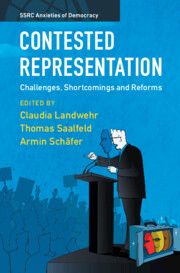Book contents
- Contested Representation
- SSRC Anxieties of Democracy
- Sponsored by the Social Science Research Council
- Contested Representation
- Copyright page
- Contents
- Figures
- Tables
- Contributors
- Acknowledgments
- 1 Introduction
- Part I The Contested Idea of Political Representation
- Part II Representation and Responsiveness in Unequal Societies
- 7 Reconsidering Representation
- 8 All about the Middle Class?
- 9 Unequal Representation and the Right-Wing Populist Vote in Europe
- 10 What Do Voters Think about the Descriptive Underrepresentation of the Working Class?
- Part III Polarization, New Cleavages, and Shifts in Democratic Government
- Part IV Constitutional Crisis and Institutional Reform
- Bibliography
- Index
9 - Unequal Representation and the Right-Wing Populist Vote in Europe
from Part II - Representation and Responsiveness in Unequal Societies
Published online by Cambridge University Press: 03 November 2022
- Contested Representation
- SSRC Anxieties of Democracy
- Sponsored by the Social Science Research Council
- Contested Representation
- Copyright page
- Contents
- Figures
- Tables
- Contributors
- Acknowledgments
- 1 Introduction
- Part I The Contested Idea of Political Representation
- Part II Representation and Responsiveness in Unequal Societies
- 7 Reconsidering Representation
- 8 All about the Middle Class?
- 9 Unequal Representation and the Right-Wing Populist Vote in Europe
- 10 What Do Voters Think about the Descriptive Underrepresentation of the Working Class?
- Part III Polarization, New Cleavages, and Shifts in Democratic Government
- Part IV Constitutional Crisis and Institutional Reform
- Bibliography
- Index
Summary
Many rich democracies witness a rising tide of populism. With very few exceptions, populist parties have scored electoral successes and often entered national parliaments. In Poland and Hungary, for example, populist parties dominate the respective party system, and in Austria, the FPÖ was part of the previous government coalition. For the first time since the fall of the Nazi regime, a right-wing populist party entered the Bundestag after the 2017 general election in Germany. The most spectacular instance of populist success is probably the presidency of Donald Trump, who won the 2016 US presidential election to the surprise of many observers. Even where populist parties are less successful on Election Day, they sometimes have a strong impact on policies. Brexit is just the most far-reaching example. In reaction to the rise of populism, a wealth of research has emerged. It deals with the most suitable definition of populism, the programmatic outlook of populist parties, supportive attitudes or the social base of the populist vote. Despite the richness of this research, we argue that most approaches to the study of populism fail to integrate fully the insights on unequal representation that have emerged in recent years.
- Type
- Chapter
- Information
- Contested RepresentationChallenges, Shortcomings and Reforms, pp. 147 - 164Publisher: Cambridge University PressPrint publication year: 2022
- 3
- Cited by

